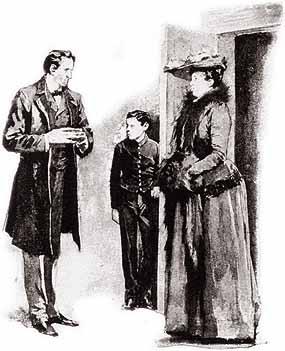As he spoke there was a tap at the door, and the boy in buttons entered to announce Miss Mary Sutherland, while the lady herself loomed behind his small black figure like a full-sailed merchant-man behind a tiny pilot boat. Sherlock Holmes welcomed her with the easy courtesy for which he was remarkable, and, having closed the door and bowed her into an armchair, he looked her over in the minute and yet abstracted fashion which was peculiar to him.

"Do you not find," he said, "that with your short sight it is a little trying to do so much typewriting?"
"I did at first," she answered, "but now I know where the letters are without looking." Then, suddenly realising the full purport of his words, she gave a violent start and looked up, with fear and astonishment upon her broad, good-humoured face. "You've heard about me, Mr. Holmes," she cried, "else how could you know all that?"
"Never mind," said Holmes, laughing; "it is my business to know things. Perhaps I have trained myself to see what others overlook. If not, why should you come to consult me?"
Women and the typewriter.
The first typewriter to be commercially successful was invented in 1868. It was commercialize by E. Remington and Sons, then famous as a manufacturer of sewing machines.
Remington began production of its first typewriter on 1873, in Ilion, New York. It had a QWERTY keyboard layout.
Remington assumed that the person typing would be a woman. The first typewriters had floral ornamentation on the case.
Women's roles in the World Wars, both One and Two, put more women into the workforce replacing men, often starting in the professional workplace as typists.
"I came to you, sir, because I heard of you from Mrs. Etherege, whose husband you found so easy when the police and everyone had given him up for dead. Oh, Mr. Holmes, I wish you would do as much for me. I'm not rich, but still I have a hundred a year in my own right, besides the little that I make by the machine, and I would give it all to know what has become of Mr. Hosmer Angel."
"Why did you come away to consult me in such a hurry?" asked Sherlock Holmes, with his finger-tips together and his eyes to the ceiling.
Again a startled look came over the somewhat vacuous face of Miss Mary Sutherland. "Yes, I did bang out of the house," she said, "for it made me angry to see the easy way in which Mr. Windibank –that is, my father–took it all. He would not go to the police, and he would not go to you, and so at last, as he would do nothing and kept on saying that there was no harm done, it made me mad, and I just on with my things and came right away to you."
"Your father," said Holmes, "your stepfather, surely, since the name is different."
"Yes, my stepfather. I call him father, though it sounds funny, too, for he is only five years and two months older than myself."
"And your mother is alive?"
"Oh, yes, mother is alive and well. I wasn't best pleased, Mr. Holmes, when she married again so soon after father's death, and a man who was nearly fifteen years younger than herself. Father was a plumber in the Tottenham Court Road, and he left a tidy business behind him, which mother carried on with Mr. Hardy, the foreman; but when Mr. Windibank came he made her sell the business, for he was very superior, being a traveller in wines. They got 4700 pounds for the goodwill and interest, which wasn't near as much as father could have got if he had been alive."